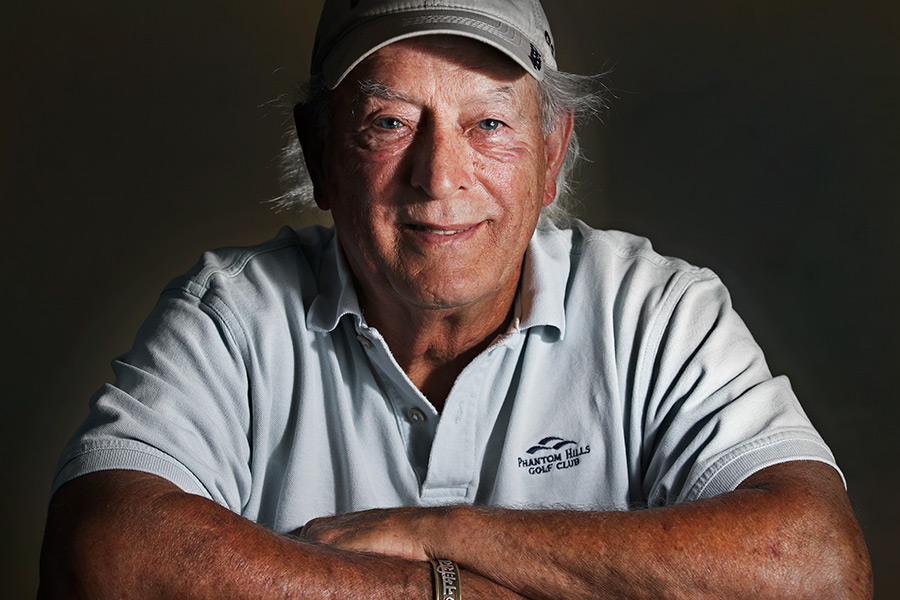A photograph published in the Oct. 13, 1979 issue of Billboard shows David Devore leaning over a mixing board beside Carlos Santana, both of them smiling and mustachioed, celebrating after putting the final touches on Santana’s LP “Marathon,” which they recorded at the vaunted Sound City Studios in Los Angeles.
The black-and-white image might be the perfect tableau to capture the Polson-based producer’s career. Devore’s resume spans decades and includes working with industry heavyweights Fleetwood Mac, Foreigner, Grateful Dead, REO Speedwagon, Ringo Starr, and Survivor, among others. And while the behind-the-scenes role of a producer or sound engineer doesn’t garner the glitz and glamour of a hit musician, his ability to coax studio performances out of a band is legendary, and the intimacy of the relationships he developed with them a testament to his talent.
“I got to work with some iconic people,” he said recently.
His career in the music industry began in Hilo, Hawaii, where he performed with the Royal Tahitians, a Polynesian ensemble that became a fixture at Disneyland’s Tahitian Terrace, a show complete with dancing girls and fire spinning.
“Walt Disney loved it,” Devore said. “He’d come into the dressing room, probably because there were usually a half-dozen dancing girls in straw skirts.”
When he had occasion to visit a music studio in Hollywood where the musical duo Delaney and Bonnie were recording an album featuring Eric Clapton on guitar, he watched as legendary sound engineer Barney Perkins work the mixing board.
“I thought, ‘OK, this is what I’m going to do,’” Devore said.
And so began his career in the production business, starting at the bottom of the barrel working as a “gopher” – or errand boy – at Crystal Sound Studios in Hollywood, where he met Richard Orshoff, who at the time was producing and engineering Jackson Browne’s 1971 self-titled debut album.
A major breakthrough came a few years later, when he landed at Sound City Studios, about which former Nirvana drummer and Foo Fighters front man Dave Grohl produced a 2013 documentary. At Sound City, Devore began working with Keith Olsen, a Grammy-winning record producer and sound engineer.
Together, they engineered Fleetwood Mac’s self-titled album, the first record to feature Stevie Nicks and Lindsey Buckingham, who joined the group after Olsen played Mick Fleetwood a song the duo had written.
Released in July 1975, the album yielded three top-20 singles and went on to sell 4 million copies. It also became Fleetwood Mac’s first number one album in the United States.
“Lindsey and Stevie were an incredible addition to the band. It was a turning point,” Devore said.
It was a turning point for Devore, too, as the list of artists he was recording grew to include Elton John, Foreigner and the Grateful Dead.
Devore worked with the Dead on their album “Terrapin Station,” which defied their previous studio recordings by blending the impulsiveness of their live shows with the high production value of their studio albums.
“Nobody had ever done that before,” he said.
In 1984, Devore helped produce and engineer REO Speedwagon’s “Wheels Are Turnin’,” which reached No. 7 on the Billboard 200 and featured “Can’t Fight This Feeling,” the band’s second and longest-running number one single.
It marked the beginning of a friendship with the band, including lead vocalist and rhythm guitarist Kevin Cronin, who visits Flathead Lake in the summer.
Although he developed lasting relationships with musicians through the years, Devore said it was never his style to fawn over a band, but rather to push the musicians to work hard and perform at a high level.
“I’m in there for a reason, not to tell them that they’re doing a good job and make friends,” Devore said.
Devore left Los Angeles for Montana after falling in love with a woman, and he never left the Treasure State.
“I sold my house, I sold everything. Man, I even sold my Mustang,” he said. “I packed up everything and I moved to Polson.”
He still dabbles as a record producer and sound engineer, and worked on the Flathead-based band House of Quist’s album.
But these days he prefers bagging peaks in Glacier National Park and golfing to the fast pace of the music industry, though he looks back on the career fondly.
“You kind of create your own opportunities, if you’re able to think that way,” he said. “Some people are happy to have the job and the paycheck and they never really move forward. I created a lot of great opportunities for myself.”
Devore acknowledges that he caught a few lucky breaks that carried him in the music industry, and that he was often in the right place at the wrong time. But he also put himself at the center of the music scene when it counted.
“If you want to rule out a lot of the things that keep your dreams from happening, get out of the place where they aren’t happening,” he said.
